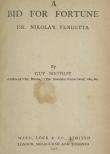 1476306798631347477.png
1476306798631347477.png
 1476306798631347477.png
1476306798631347477.png
'With money in his pocket after making his fortune in the South Seas, Richard Hatteras has London at his feet. Running afoul of the deadly Dr Nikola, however, was the worst thing he could do. Soon, young Dick is swept up into a maelstrom of blackmail, hypnotism, deceit and murder, where his betrothed is in danger, his potential father-in-law’s reputation is on the brink of ruination, and his very sanity is at stake. What can a two-fisted adventurer do against the vast and cold intellect that is Dr Nikola?'
Source: Publisher's blurb, Chimaera edition.
 A Bid for Fortune
( dir. Sidney Morgan
)
1917
London
:
Unity-Super
,
1917
Z1686429
1917
single work
film/TV
fantasy
adventure
A Bid for Fortune
( dir. Sidney Morgan
)
1917
London
:
Unity-Super
,
1917
Z1686429
1917
single work
film/TV
fantasy
adventure
An eminent scientist pursues an ancient Chinese staff, fighting both the dedicated protectors of the staff and the powers of the occult.
'By the end of the nineteenth century the pernicious racial term “yellow peril” had entered the common parlance of Victorians across the British Empire. Ironically, this insidious imperial myth that China would overrun the West owed its genesis to the impact of European, and particularly British imperial activity, on China in the late-nineteenth century, rather than to any expansionary Chinese aims or activity. The western impact was bi-faceted, involving both the physical incursion of westerners into China, and the related movement of Chinese people overseas to work in western nations and colonies. Under the international coerced labour phenomenon known as the “coolie trade,” Chinese people were brought across the British Empire as far as the settler colonies of Australia and South Africa, and even to the plantations of the British West Indies. Despite the relative powerlessness of their position as indentured or indebted immigrants, they were inevitably perceived as hostile aliens who threatened "white" society. This essay examines the impact of Australian anti-Chinese sentiment on representations of Chinese people in the works of Guy Boothby, an Adelaide-born author who emigrated to London in 1893. It explores Boothby’s representations of Chinese people in the imperial spaces of Britain’s Australian and Southeast Asian colonies, and also in the informal imperial spaces of contact in “foreign” China, in the cities and coastal locations where the British Empire was making its presence and influence felt, in works including Boothby’s travelogue, On the Wallaby (1894), the Dr Nikola series of novels (1895-1901), “The Story of Lee Ping” (1895), The Beautiful White Devil (1896) and My Strangest Case (1901). It argues that these superficially disinterested but consistently derogatory representations of the far-flung Chinese contributed to the deplorable international myth of the yellow peril, but also could not help revealing the important and largely overlooked presence of the Chinese in the spaces of the British Empire, demonstrating the impact of the coolie trade on imperial society and signalling the multifaceted nature of the British Empire’s involvement with China.' (Publication summary)
'In this essay, I want to look back to an earlier period in the history of the international bestseller, when the modern genre system emerged in the Anglosphere. In particular, I want to trace the participation of Australian writers in this moment, focusing on their presence in the transatlantic book trade and their movement from Australia to Britain and the United States, and sometimes back again. 'Australian literature', in this view, was international (and not merely imperial) before it was ever national' (p. 86).
 Writing the Colonial Adventure : Race, Gender and Nation in Anglo-Australian Popular Fiction, 1875-1914
Oakleigh
:
Cambridge University Press
,
1995
Z480378
1995
single work
criticism
Writing the Colonial Adventure : Race, Gender and Nation in Anglo-Australian Popular Fiction, 1875-1914
Oakleigh
:
Cambridge University Press
,
1995
Z480378
1995
single work
criticism
'This book is an exploration of popular late nineteenth-century texts that show Australia - along with Africa, India and the Pacific Islands - to be a preferred site of imperial adventure. Focusing on the period from the advent of the new imperialism in the 1870s to the outbreak of World War I, Robert Dixon looks at a selection of British and Australian writers. Their books, he argues, offer insights into the construction of empire, masculinity, race, and Australian nationhood and identity. Writing the Colonial Adventure shows that the genre of adventure/romance was highly popular throughout this period. The book examines the variety of themes within their narrative form that captured many aspects of imperial ideology. In considering the broader ramifications of these works, Professor Dixon develops an original approach to popular fiction, both for its own sake and as a mode of cultural history.' (Introduction)
'In this essay, I want to look back to an earlier period in the history of the international bestseller, when the modern genre system emerged in the Anglosphere. In particular, I want to trace the participation of Australian writers in this moment, focusing on their presence in the transatlantic book trade and their movement from Australia to Britain and the United States, and sometimes back again. 'Australian literature', in this view, was international (and not merely imperial) before it was ever national' (p. 86).